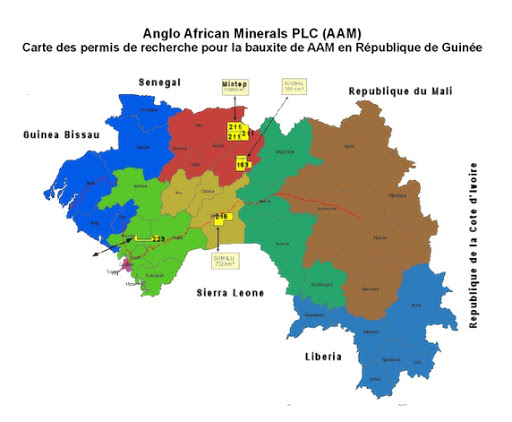

Anglo-African Minerals, an Irish exploration firm has announced a €200 million joint venture with a Chinese group to develop a bauxite mining project in Guinea.
Anglo-African owns four bauxite licences Guinea and the firm confirmed that it had entered into the an initial agreement with the two-company consortium to develop their flagship Forward Africa Resources (FAR) project located in the Kindia and Dubreka regions. The firm headquarters in Cashel, Co Tipperary and has also engaged in sustainable development programme to benefit the local community.
The Chinese consortium consists of China New Era Group and China Geo-Engineering Corporation and a new subsidiary company would soon seek listing on the Hong Stock Exchange.
Commenting on the JV, chief executive James Lumley said, “This joint venture will secure the future of the Anglo-African Minerals projects and provide significant share dividend inflows.” The project IS expected to create about 1,200 jobs. Under the project, rail infrastructure would be developed to enable bauxite output from FAR to be carried to the Conakry port and then to Panama by barge. The FAR licence covers a total area of 338km square feet and has a potential resource of up to 300 million tonnes of high-grade bauxite. The firm is expecting an output of two million tonnes per year.
The project IS expected to create about 1,200 jobs. Under the project, rail infrastructure would be developed to enable bauxite output from FAR to be carried to the Conakry port and then to Panama by barge. The FAR licence covers a total area of 338km square feet and has a potential resource of up to 300 million tonnes of high-grade bauxite. The firm is expecting an output of two million tonnes per year.
According to expert forecasts, global consumption of aluminium would reach 82 metric tonnes in 2025. With about 7.4 billion tonnes of bauxite reserve which is about 40 per cent of the total global reserves, Guinea is well positioned to meet the growing demand.
{googleAdsense}
“It’s a fantastic deal and a great story for a small company based in Cashel which ended up operating out of London, raised money in Azerbaijan to drill holes in Africa, and then bought in a Chinese consortium,” said John O’Connor, the chairman of Anglo-African Minerals.
Mr O’Connor also said that the company had decided to engage Plan Ireland International to avoid disrupting the lifestyle of the local community by creating sudden work and revenue exposure to the small rural community.
“I got in touch with Plan to tell them we were going to be in Guinea and that we’d like to support their work there. However, it very quickly turned into a situation in which we became the net beneficiaries because of course they knew much more about what was going on in the region than we did,” he added.
{alcircleadd}



Responses






